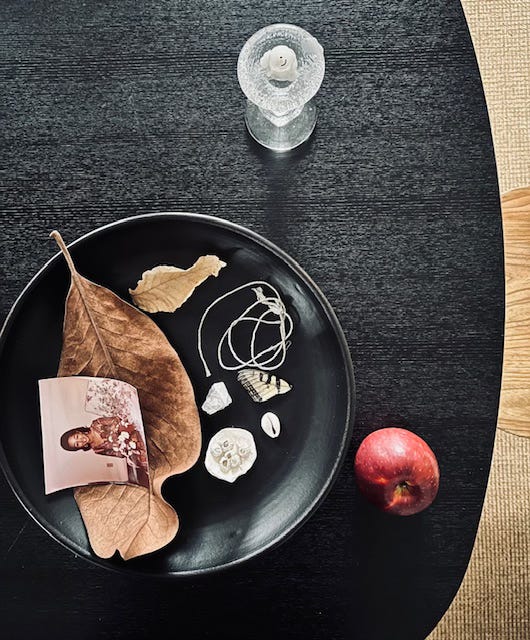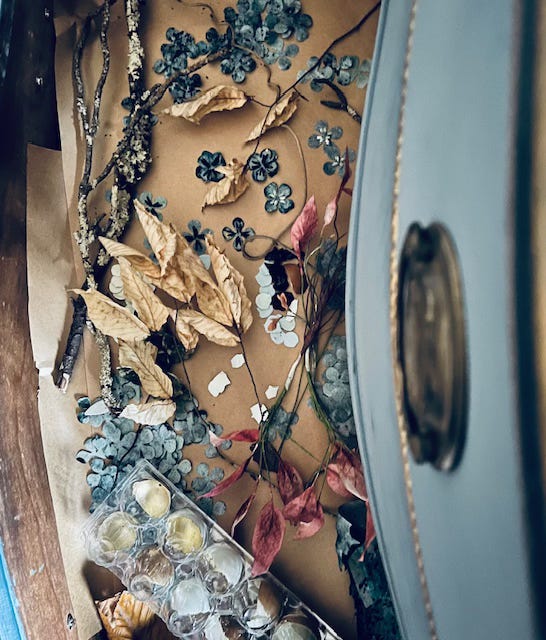The ' holy din and racket' of the holidays and the first full moon of the New Year are behind us now. A surprise snowfall earlier this month (and then another one!) helped usher a deep winter quiet, unsettling in its stark contrast to the fiery chaos devouring the other side of the country. I’m slowing down according to the logic of the season though, and tending to stews, books, and dry skin. And as one does in January, I’m also thinking about the year(s) ahead. My own orientation towards goals and resolutions and new leafs is necessarily being pushed and pulled by the exigencies of extreme climate and political change.
I’m thinking of a fire ecologist I heard on public radio who explained that contrary to the under-nuanced way many of us hold the idea of wildfires, they are not at all uniform, all-consuming and simply, you know, “hot.” Instead, they are volatile, variable, and responsive. Structures, materials, plants, terrain, slope, wind, recent weather history, and so forth, work together in various combinations to generate a surprising range of temperature fluctuation and shifting eddies, pools, caves, tunnels, and little oases of cool and relative calm. I’m trying to think of our current polycrises as affording similar spaces and opportunities. Spaces to revisit practices. To renew commitments. To refocus our attention. To rethink our approach. To rest temporarily.
I’m pondering the kinds of questions Anand Ghiridharadas asks in his broadly read post How to live under Trump II: What will be your posture in a second Trump era? Resistance? Retreating into the local? Returning to your craft? These, to me, are great prompts. He’s capturing the fact that so many of us are recognizing that it’s time to reframe the fight. Maybe in terms of bridge or cathedral building. The posture has to acknowledge that we are building something that will get us to what’s next. Something we will not see to completion in our lifetimes. Maybe the reframe is in terms of Bambara’s irrisistability (What kind of community are you identifying with?!) or in terms of pleasure a la brown. The posture must redefine what is essential and what is sensuously compelling! Through the lense of these terms, what does it even mean to be in fighting shape?
I researched a piece exploring adaptive leadership models last year and have been thinking about one of the central questions this framework asks: ‘who needs to learn what for the work to move forward?’
In light of all this and all these questions, I’m considering a posture, in the sense that Anand means it, of curiosity around the kinds of skills we (I) will need to move forward. We will burn out trying to reach the goal at the end of a line if we don’t learn to live within the cycles and seasons of process. We can read all the mutual aid manifestos we like (and we should!) but the knowledge won’t go far without a practical, hang-up free understanding of how to receive help ourselves. Any skills any of us have now, we have because at some point, we needed them. There are so many others we did not have the opportunity to learn. I’m interested in those ones that are fundamental to movement but so subtle or basic that they are overlooked or even unrecognized as skills that can be learned and imperfectly practiced. Living in season and cycle, staying open. Listening. Grieving well, of course. Asking for and receiving help.
The poplar in my backyard, center framed in the window at my writing desk, is foregrounded and towering. Her branches are mostly naked now but some of the fatter ones are swaddled in bright green moss. One such blanketed branch reaches out towards my window. It looks velvety and plush and inviting. It’s still dripping filtered crystals of early morning rain. I rest my eyes there in meditation. My attention is rewarded, first with a brief visit by a dark-eyed junco. He perches among the moss I think to survey the ground below before fly-hopping down to join a couple of others in the search for seeds. A ruby-crowned kinglet is next to light on the poplar’s outstretched arm and later, an Eastern bluebird couple. The uncharacteristically wintry weather has energized the birds this morning to my delight and they renew my appreciation for the tree. Her green-gloved arm is always extended. A consistent place to rest and gain perspective. One of the poplar’s most popular offerings, apparently.
Tracking a flash of movement in the upper corner of my window I catch a partial V of geese flying towards the sun. Their underbellies glow in the light like polished copper pots.
The rooted and flying folk in my backyard are prompting me to start with the idea of support this New Moon. Specifically, the subtle practices of asking for and receiving help. How can I be like the geese on long migratory treks who, when tired call out for another to take the lead position? Who in my life might offer outstretched arms where I can perch when I need a break, a soft place to land, or a different perspective?
I often remind those I grief walk with that grieving is natural, an innately human skill, and one our ancestors knew how to practice. I invite those wise and well ancestors into our sessions to guide and support us and I believe they do. The irony is that I have little altars all over my house but I tend to them inconsistently and don’t often enough consider the efficacy of my ancestors’ wisdom and magic as refuge, bulwark, or inspiration in my own journey.
This might be a place to start.
A favorite altar is a black ceramic cake stand I found in a shop in Brevard, NC after completing the James Beard Chef’s Boot Camp in 2022. (What really is a cake stand but a little altar? What really is an altar but a mossy branch inviting spirit to momentarily alight?). My intention this moon cycle is to commit to keeping it fed and watered and to visiting my heart upon it each morning in acknowledgement of the myriad unspoken ways my ancestors always already extend support and provide wind at my back.
I’m wondering how practicing this ritual will help me
identify, befriend and honor my own needs and vulnerabilities.
see the ways I resist dependence
expand my gratitude practice
release the compulsion to demand that help take a specific form
grow a more creative outlook around meeting and getting needs met
In the meantime, Mary Oliver is always a gentle guide:
Praying
It doesn’t have to be
the blue iris, it could be
weeds in a vacant lot, or a few
small stones; just
pay attention, then patch
a few words together and don’t try
to make them elaborate, this isn’t
a contest but the doorway
into thanks, and a silence in which
another voice may speak.
In my case, the doorway is a magnolia leaf, a silver string of friendship, a reminder of matrilineal lines, water, earth, air, fire, and a cowrie for protection.
I’ll approach it morning by morning, quietly knocking for the help to walk through.
What will be your posture this year and beyond? What skills do you need to learn in order to move us forward? What rituals or practices are supporting you?
xx







Thank you for your wisdom and the way you weave words that always feel like a warm embrace or the lush blended flavors of cakes I still dream about tasting. I may have to build an altar for the ancestors of the land ( mound builders) that I express gratitude for and ask guidance from when I'm hiking. I need them even closer.
Thank you Monica-- thinking about all of this. I recently lost my dad, and have slowly been building an altar to spend time with. And just last night, in a group of people I greatly admire, we were asked How are you honoring your ancestors? and What does survival mean to you? So far i am still teasing the word survival away from a physical body and towards a web of life.....and then back again.